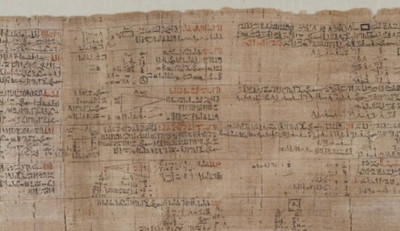The problem is that we have only a very few surviving Egyptian mathematical documents-many others must have perished.
因为保存至今的埃及数学文献数量极少:其余大部分都已腐烂。
So, although we have to assume that there was a flourishing higher mathematics, we just don't have the evidence for it. Clive Rix again:
虽然能推测当时曾存在蓬勃发展的高等数学,却无法获得佐证。莱斯特大学的克莱夫里克斯教授强调了莱因德纸草书的重要性:
"If we didn't have the Rhind Mathematical Papyrus, we'd actually know very little indeed about how the Egyptians did mathematics.
如果没有莱因德纸草书,我们很难确切了解他们的数学水平到底如何。
The algebra is entirely what we would call linear algebra, straight line equations.
里面的代数就是如今我们说的线性代数与直线方程。
There are some what now we would call arithmetical progressions, which are a little bit more sophisticated.
还有一些我们如今称为等差级数的内容,稍为复杂。
The geometry's a very basic kind as well.
而几何学也非常基础。
Ahmose tells us how to calculate the area of a circle, and how to calculate the area of a triangle.
雅赫摩斯告诉我们如何计算圆和三角的面积。
There is nothing in this papyrus that would trouble your average GCSE student, and most of the stuff is rather less advanced than that."
这里面的题目一般的中学毕业生都会解答,有的甚至难度还更低。
But this is, of course, what you'd expect, because the person using the Rhind Mathematical Papyrus is not training to be a mathematician.
当然,这一点无可厚非,因为纸草书的用途并非培养数学家。
He just needs to know enough to handle tricky practical problems-like how to divide up rations among workmen.
使用它的 人只需了解如何处理现实中的一些麻烦问题,如怎样给工人分配供给的物品。
If, for instance, you have ten gallons of animal fat to get you through the year, how much can you consume every day?
再举一例,如果你有十加仑的动物油脂,供你使用一年,每天能用多少?
Dividing 10 by 365 was as tricky then as it is now, but it was essential if you were going to keep a workforce properly supplied and energised.
用十除以三百六十五,不管在当时还是现在,都不是简单的运算。但如果你有一群需要你分配食物以保证精力的工人,就非得算出答案不可了。
As Eleanor Robson, a specialist in ancient mathematics from Cambridge University explains:
剑桥大学古代数学专家埃莉诺罗伯森解释道:
"Everyone who's writing mathematics is doing it because they're learning how to be a literate, numerate manager, a bureaucrat, a scribe-and they're both learning the technical skills and how to manage numbers and weights and measures, in order to help palaces and temples manage their large economies.
每一个做这些数学题的人,都想成为一个能写会算的管理者、政府官员或书记员。他们需要学习技术,也要学习掌握数字、重量与尺寸,以帮助宫廷和庙宇管理他们庞大的经济。













